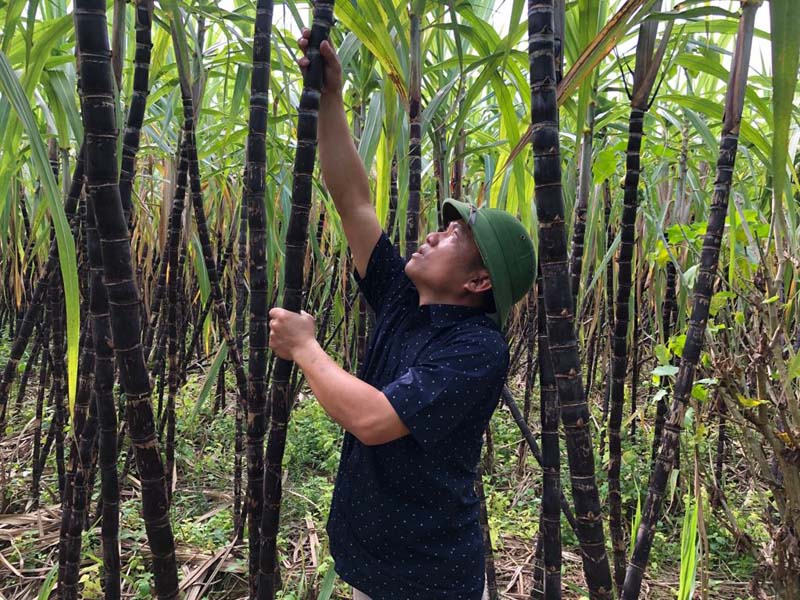
(HBO) – Since 2016, tissue culture sugarcane has been put into production in Hoa Binh province to gradually replace the local purple sugarcane variety which has been degraded through many years of cultivation. This model is part of a project replacing the purple sugarcane variety with tissue culture sugarcane implemented by the local centre for application of scientific-technological advances.
 Farmers
in Treo Ngoai hamlet, Nam Phong commune (Cao Phong district), grow tissue
culture sugarcane, which has proved superior economic efficiency.
Farmers
in Treo Ngoai hamlet, Nam Phong commune (Cao Phong district), grow tissue
culture sugarcane, which has proved superior economic efficiency.
By now, harvest has completed on all the areas
under tissue culture sugarcane, with each stalk sold for 5,500 to 6,000 VND,
bringing a profit of about 50 percent for growers.
Hoa Binh localities have been expanding the growing area and
directing farmers to proactively seek markets.
Vu Quang Hung, head of the agriculture and rural
development office in Tan Lac district said the sale of purple sugarcane is
facing difficulties, with prices lower than that of tissue culture plants by
about 2,000 VND each stalk.
After three years of implementing the cultivation
of tissue culture sugarcane in Cao Phong, Tan Lac and Yen Thuy district, Hoa
Binh has expanded the growing area to 145 hectares.
Specifically, Cao Phong district now has 35.67
hectares under tissue culture sugarcane, Tan Lac 73 hectares, and Yen Thuy 33.2
hectares.
Though still modest, the cultivation of tissue
culture sugarcane has helped remove difficulties in production and sales of
purple sugarcane in recent years. The province currently has 3,000 ha under
purple sugarcane.
The project of replacing purple sugarcane with
tissue culture sugarcane was carried out by the local centre to conserve the
gene of purple sugarcane using Invitro technology. The cultivation of tissue
culture sugarcane was first implemented in Tan Lac and Cao Phong districts.
Tissue culture sugarcane has received good feedback on the market on its
quality. This is an important prerequisite for the province to expand the
cultivation of this plant./.
According to data from the Hoa Binh Provincial Party Committee, the industrial production index for the first six months of 2025 is estimated to have increased by 20% compared to the same period last year. This marks the highest year-on-year growth rate for this period since 2020.
In the first six months of 2025, Hoa Binh province’s export turnover was estimated at 1.145 billion USD, marking an 18.11% increase compared to the same period in 2024. Import turnover was estimated at $ 804 million, a 17.15% increase, which helped the province maintain a positive trade balance.
The lives of the ethnic minority farmers in Tan Lac district have gradually improved thanks to the new directions in agricultural production. This is a testament to the collective strength fostered through the professional associations and groups implemented by various levels of the district’s Farmers’ Union.
With the motto the "product quality comes first,” after nearly one year of establishment and operation, Muong village’s Clean Food Agricultural and Commercial Cooperative, located in Cau Hamlet, Hung Son Commune (Kim Boi district), has launched reputable, high-quality agricultural products to the market that are well-received by consumers. The products such as Muong village’s pork sausage, salt-cured chicken, and salt-cured pork hocks have gradually carved out a place in the market and they are on the path to obtaining the OCOP certification.
In the past, the phrase "bumper harvest, rock-bottom prices" was a familiar refrain for Vietnamese farmers engaged in fragmented, small-scale agriculture. But today, a new spirit is emerging across rural areas of Hoa Binh province - one of collaboration, organisation, and collective economic models that provide a stable foundation for production.
Maintaining growing area codes and packing facility codes in accordance with regulations is a mandatory requirement for agricultural products to be eligible for export. Recently, the Department of Agriculture and Environment of Hoa Binh province has intensified technical supervision of designated farming areas and packing facilities to safeguard the "green passport" that enables its products to access international markets.



 Farmers
in Treo Ngoai hamlet, Nam Phong commune (Cao Phong district), grow tissue
culture sugarcane, which has proved superior economic efficiency.
Farmers
in Treo Ngoai hamlet, Nam Phong commune (Cao Phong district), grow tissue
culture sugarcane, which has proved superior economic efficiency.